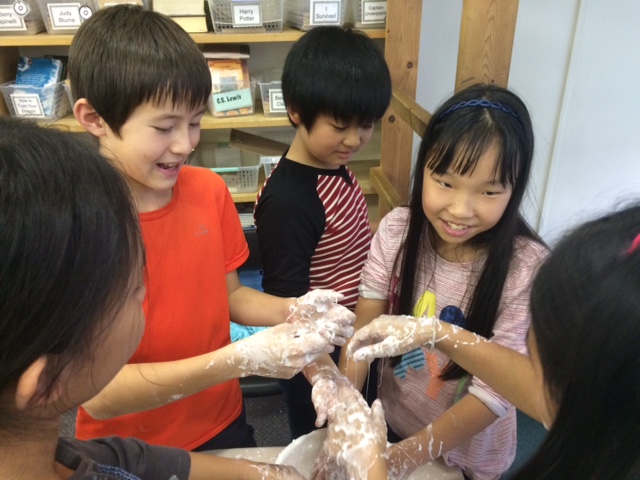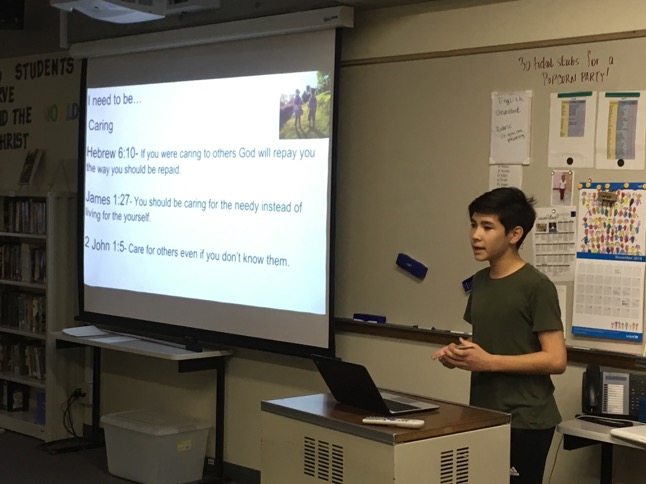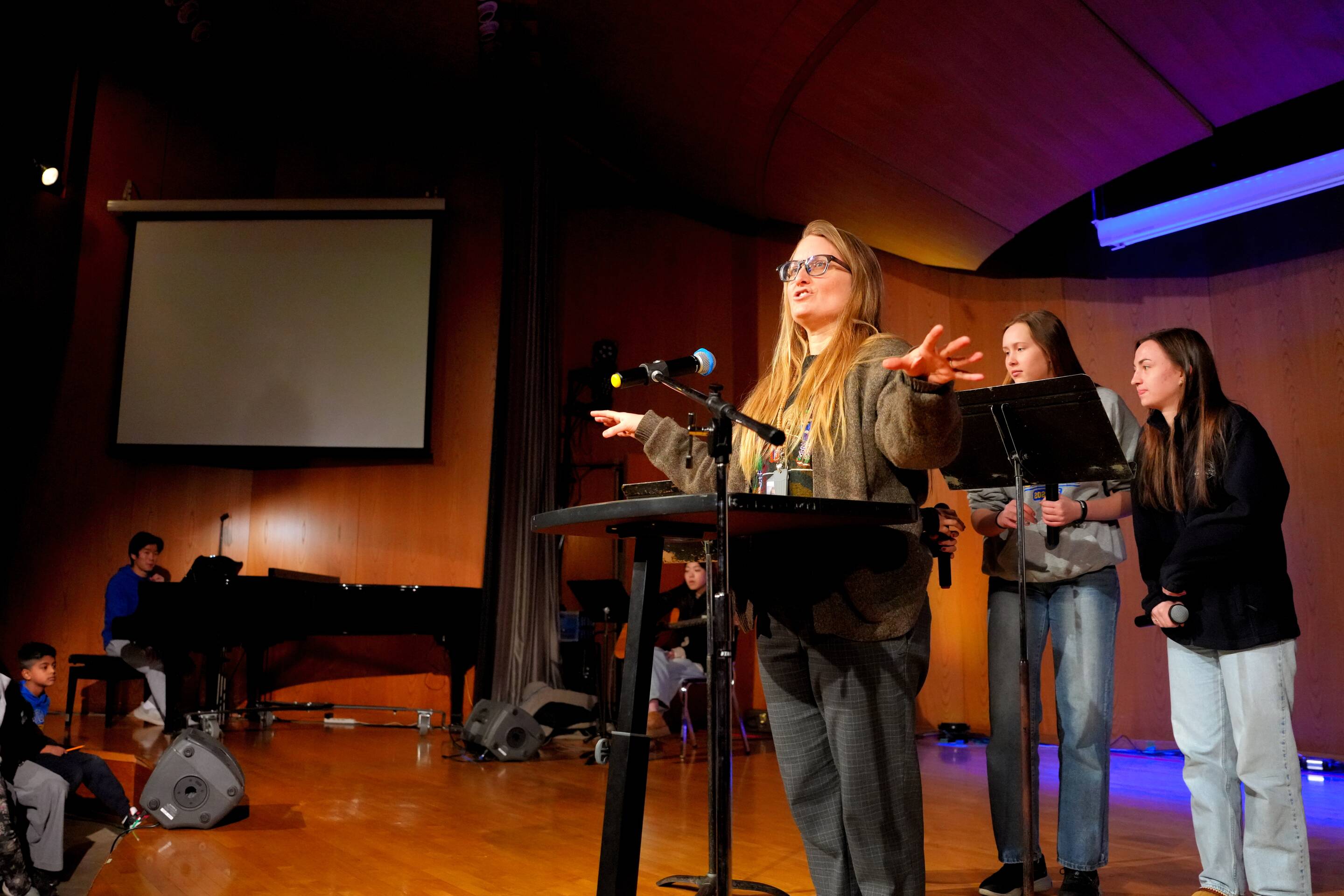Biblical Integration
CAJ teachers seek to integrate biblical truth into everything they teach. This means students wrestle with what the Bible teaches in classes other that their Bible class and in every division of the school.
Christine Ijima teaches grade 5. She writes:
In fifth grade we are beginning to investigate mixtures and solutions. Solutions are a type of homogeneous mixture, where the components cannot be easily separated once blended. How do the students see God in what we are learning? Well, after mixing cornstarch and water to create Oobleck, we wondered what we had. After blending the components, the concoction stiffened when held, then dripped through our fingers until it dried up on the table. Although it blended as a solution should, it also separated as it dried or was left alone. One student described Oobleck as when we touch it, and then release it, it’s like when we do something good, we stick to God. When we release from Him, we fall apart. Another thought, without God we can’t make these things. Many could easily see that there must be a creator of the things we see. Soon, we will create crystals with baking soda and see God’s hand in the beauty of these tiny elements.

Sachie Hara teaches grade 7 English, among other subjects. She writes:
In seventh grade, students prepared “A Day in the Life” presentation, following reading the short story “A Day’s Wait,” by Ernest Hemingway. In the story, a boy spends all day worrying about his sickness, fearing he will die soon. In the end, we find out it was all a misunderstanding; he is fine. After reading the story, we asked ourselves, “How do we spend our time?” and “How should we spend our time?” The students reflected on the usual parts of a typical day that they experience and examined how their time is spent. When they actually wrote out what they did throughout the day, they realized their time was not always well spent, and there were conflicts in their lives. Some of the conflicts shared were time management issues, anxiety, and conflicts with others including friends, siblings and parents. After identifying some conflicts, the students opened their Bible to see what the Bible says about their conflicts and how they could make plans to resolve these conflicts. Then, the students prepared a 4-6 minute “A Day in the Life” presentation to share with their classmates. After sharing about her anxiety towards schoolwork, one student explained how the Bible talks about casting all anxiety on God (I Peter 5:7) and not be anxious about anything (Philippians 4:6). Then she said, “I need to remind myself that God is greater than my anxiety.” She also made a plan to pace her assignments out so she would not have to worry. Another student shared that one of his conflicts was that he would argue frequently with his sister. After reading Proverbs 15:18, which states, “A hot-tempered person starts fights; a cool-tempered person stops them,” he realized that he would need to be more patient with his sister, and he could be the one to stop the argument. The Bible teaches us how we should live our lives, and 7th graders learned to connect the Biblical teachings to their lives as they reflected on their lives and made goals and actions plans.

Nate Gibson teaches grade 11 Humanities, a course integrating American literature and history. He writes:
Is justice about protecting individual freedom? Is it about benefiting the majority? Is it about upholding virtue? My 11th graders start the school year with a host of different assumptions about what justice means, and how it is shaped by media, culture, and society. With so many competing visions for what justice is, how can we as Christians responsibly and consistently follow God’s call for us to do justice? These are the questions that loom over us as we start each new year in Humanities 11-- a blend of U.S. History class and English class. To establish a foundation for the year to come, our first reading assignment is a pair of chapters from two different authors: one from Generous Justice by Tim Keller, the founder of Redeemer Presbyterian Church in New York City, and one from Healing for a Broken World by Steve Monsma, a former politician and Senior Research Fellow at Calvin College’s Henry Institute. As the students read, discuss, and reflect on these chapters, they recognize a common definition of justice: giving people their due as image-bearers of God. Throughout the first unit, we strive to unpack what this means so that we can refer back to this definition in coming units, applying it to such diverse topics as the Salem Witch Trials, the writing of the Declaration of Independence, slavery, the dropping of the atomic bombs, and more. My hope each year is that as students study history and literature with this overarching theme of justice in mind, they will find themselves asking what it means for them to give others their due as image-bearers in their lives at CAJ and beyond.

聖書を授業に取り込む
CAJの教師たちは聖書の真理を毎日の授業に取り入れています。それはCAJの児童生徒は聖書の授業だけでなく、他の授業全般において聖書の教えに取り組んでいるということを意味しています。
クリスティン・イイジマ 5年生担任
5年生では、混合物と溶解物について学び始めます。溶解物とは、均一混合物という一度混じり合ってしまうとなかなか分離できない成分からできています。このような学習において、児童たちはどのように神様を見出すのでしょうか。水とコーンスターチを混ぜて、ウーブレックを作ったあとに考えてみます。合わさった成分は固形物のようですが、手に持つと指の間から垂れ落ちて、机の上で乾燥してしまいます。うまく混ざった溶解物になっても、乾燥や放置した状態になると再度分離してしまいます。一人の児童は「ウーベリックを手に持って、また手から離すのは、自分が何か良いことをするときに神様にくっついていて、自分が神様から離れてしまうとばらばらになるのに似ている」と言いました。また別の児童は、神様の存在なしには、このような成分は作ることができないと思いました。目に見えるものを通して創造した神様の存在を容易に理解できるのです。この後に重曹とソーダを使ってクリスタルを作ります。これらの小さな要素の中に作られた神様の美しさを見いだすことを学んでいきます。

サチエ・ハラ 7年生英語教師
7年生は、ヘミングウェイの「死ぬかと思って」(原題:A Day’s Wait)を読んだ後「人生の一日」という発表を行います。ある少年が病気になり、自分はもう死ぬのだと一日中心配しながら過ごしますが、最後には全てが誤解で、少年は大丈夫だったという結末です。この話を読み終えて「自分はどう時間を使い、またどのように使うべきなのか」と問いかけます。生徒たちは典型的な一日の一部を設定し、どのように時間が使われたかを振り返ってみます。一日何をしていたかを実際に書き出すと、実は賢い時間の使い方をしていなかったことや日常生活の問題が見えてきます。時間管理の問題、心配事、友人や家族間の人間関係の問題などが分かち合われました。自分の持っている問題が何であるのかを発見し、聖書を開き、聖書がその問題について何を語っているかを見つけ、解決方法のプランを考えます。その後「人生の1日」の4 ~ 6分ほどの発表をします。学校の勉強に対する不安を分かち合ってくれたある生徒は、聖書には「思い煩いをいっさい神にゆだねなさい( 第一ペテロ5:7)」、「何も思い煩わないで(ピリピ4:6)」と書いてあり、自分は、神様が自分の心配事よりもずっと偉大な方であることを思い起こす必要があり、併せてもう心配しなくてもすむように計画的に宿題に取り組みたいと言いました。もう一人の生徒は、彼がよく妹と口げんかをしてしまうことが問題だと分かち合ってくれました。「激しやすい者は争いを引き起こし、怒りをおそくする者はいさかいを静める」と書かれた箴言15:18を読んで、妹に対して自分はもっと辛抱強くならなければいけないこと、そして自分がいさかいを静める者になれることに気がついたと語ってくれました。聖書には私たちがどのように生きるべきかが書かれていて、自分たちの日常を振り返りながら、目標や計画を立てることによって自分の人生と聖書の教えが結びついていくことを学びます。

ネイト・ギブソン11年生人文学 – アメリカ文学と歴史統合クラス教師
正義とは個人の自由を守ることでしょうか。大多数の人に益をもたらすことでしょうか。道徳を守ることでしょうか。11年生のクラスでは、学年度の始めに「正義とは何か」について多くの仮説を立て、正義の概念がメディア、文化、社会によってどのように形成されているかを考えます。正義とは何かという概念には様々な考え方がありますが、正義を行うように神様から示されているクリスチャンとして、私たちはどのようにすれば確実に首尾一貫して正義を行うことができるのでしょうか。11 年生の人文学のクラスでは、いつもこのような質問を考えながら始まります。このクラスはアメリカの歴史と英語を統合したクラスです。これからの1年間の基礎を築くため、まず二人の著者による本を数章読みます。一冊目はニューヨークにあるリディーマー長老教会の創始者ティム・ケラー著の「Generous Justice」、二冊目は政治家を務めた後、カルビンカレッジ ヘンリー インスティテュート研究所でシニア研究員を務めたスティーブ・モンスマ著「Healing for a Broken World」です。これらの章を読み進め、話し合い、考えるうちに、正義の定義における共通点を発見します。それは「神に似せて創られた者として、人が受けるべきものを与える」ことです。まずはじめのユニットでは、それが何を意味するのかを紐解き、その後のユニットでもこの定義を応用します。その後に学ぶ「セイラム魔女裁判」、「アメリカ独立宣言」、「奴隷制度」、「原爆投下」などの様々なトピックにもこの定義を当てはめます。毎年、正義という大きなテーマを念頭において歴史と文学を学ぶ度に、自分の置かれたCAJでの生活、またCAJを超えた生活の場において、人が神様に似せて創られた者として受けるべきものを与えることとは何か、を自問自答できるようにと願っています。

SWOW
Grade 9 - Keith Kelleth
SWOW in 9th grade is a much more relaxed pace than the later years, but that’s intentional. Our goal is to begin to introduce the ideas and skills of leadership. We want to get these students to consciously notice things about the way they communicate, the way they listen, and the way they get things done. The movies we watch are fun, but they’ve been chosen with specific themes in mind. The hike is difficult, but we want them to see how they deal with each other under those conditions. The challenges they’re given need to be solved creatively, and so they need to listen to each other and think in new ways. They have to know when to step up and lead, but also when to take a step back and follow.
While the different teams the students are divided into really develop their identity over the week, and a little healthy competition can help the teams bond, the service project at the end of the week helps them see just how much that collaborative effort can accomplish. All in all, freshman SWoW is really the jumping off point for their next three years, and so it’s important to start them off in the right frame of mind. And of course, they get to have some fun too! :)
Grade 10 - Yujiro Fujiwara
The experiences lived by students at 10th-grade SWOW are designed to foster leadership skills in students as they connect their intellect and emotions with nature. One of the goals of the week is that students may form a better understanding of their role as steward-leaders as they see how their decisions and behavior may have an impact on the environment.
On the intellectual aspect, students engage with science content related to freshwater and its importance, participate in the collection of water parameters, and learn about native animals and plants in the area.
On the emotional aspect, students deepen their relationships among their peers and increase their appreciation for nature. Students get time to reflect and come up with personal sustainability projects that can be implemented in short, medium, and long-term timeframe
Grade 11 - Ryan Potter
Having finally arrived at the campsite after a long day of hiking, it’s time to eat–dinner is no longer as simple as going home, or stopping at the convenience store, though. We gather around the instructions as the light fades as the student leaders discuss what needs to be done in order to make the meal: Who is carrying the cutting board and ingredients for supper? Who chops the carrots and potatoes? Who knows how the stoves work? Will we have enough water tomorrow? On Wilderness Camp, students learn that CAJ's Student Objectives are not just theory: either we work together as Productive Collaborators, or we don’t eat. Being a Faithful Caretaker takes on a whole new meaning as the student leaders discuss who gets a second serving of the evening meal: giving a struggling teammate a larger portion of the limited food is as much being a Faithful Caretaker as is cleaning up the campsite in the mornings.
In the morning, the student leaders, tasked with getting their team to their next camp site, use orienteering skills that they have only just learned, where a mistake could mean hours of wasted energy, and potentially a very uncomfortable night of fitful sleep. Teachers and other team members can provide wisdom, advice, and tips, but the advice needs to be asked for, listened to, and used; student leaders need be Effective Communicators as they ask, Responsible Learners as they listen, and Discerning Thinkers as they lead, in order to successfully lead.
Experiential learning opportunities such as CAJ's Wilderness Camp program give the students the opportunity to see that CAJ’s Student Objectives are much more than words on a wall or an assignment, rather, through growing proficiency in the CAJ student objectives, the students are learning and experiencing real servant leadership.
Grade 12 - 2 Senior Students:
Joseph
The trip to Nagasaki gave deep insight on early Christianity in Japan. Especially after reading Silence, the sites that we visited linked to the themes of martyrdom and Kakure Kirishitans, of which we discussed during Japanese Culture. I was challenged to reflect on my faith and was opened to a new perspective of thankfulness and inspiration.
I think that this was a nice opportunity for us seniors to be able to learn more about Christianity and the meaning it holds for our generation of believers!
Maika
The atomic bomb museum opened my eyes to the destructive power that we can have as humans. Just to imagine waking up to all that I know completely obliterated with no trace of the place and people I call home, was so difficult. This was almost frustrating because despite how much I wanted to understand it beyond just facts, there was still a sense of detachment. However, I realized that the fact that I was trying was the most important part, since part of serving the world for Christ is to be aware of the consequences of our actions.
SWOW
9年生--キース・ケレス
9年生のSWOWは高学年に比べてかなりゆったりしたスケジュールで行われますが、それには理由があります。リーダーシップの概念とスキルをまず教え始めること、これが9年生にとってのSWOWの目標です。コミュニケーションをどのように取るのか、話をどう聞くのか、そしてどう処理していくのか、生徒たちには、ひとつひとつ意識的に注意を払って欲しいのです。面白い映画を見ます。でも明確なテーマを決めて選んでいます。ハイキングに行くと状況は厳しくなります。しかし異なる環境下でも、お互いとどのように関わるのかを学んで欲しいのです。課題に直面したとき、建設的な解決法を見い出して欲しいのです。そのために、お互いの意見を注意して聞き、今まで思いつかなかった新たな手段を探って欲しいのです。それぞれが、いつ先頭に立ちリードすべきか、また、いつ引き下がって従うべきかを理解しなければいけません。
生徒たちはチームに分かれて様々な競技に参加します。その結果、1週間で生徒同士のきずながとても強まります。しかし、本当にクラスとして一つになるのは、奉仕の活動に携わっているときに、お互いに協力し合うことから生まれてくる一体感を目の当たりにする時です。
高校9年生のSWOWは次の3年間のスタート地点ですから、正しい心構えで始めることは大切です。同時に楽しむことも大切です!
10年生--藤原 裕次郎
10年生のSWOWは、リーダーシップスキルを培う場です。自分が持つ知識や感情と自然界との触れ合いの中で、それを養っていきます。1週間の目標の一つは、仕えるリーダーとしての役割をより深めることです。自分の決断や行動が環境にどのような影響を与えるのかを考えて欲しいのです。
知識の面で言うと、例えば、生徒たちは淡水を採取して、科学的見地からその成分と重要性を調べ、周辺の生き物や植物に及ぼす影響を探求していきます。
感情の面で言うと、生徒同士の信頼関係を深め、自然への感謝の念を深めます。また、生徒たちは、短期、中期、長期の三つの観点からサスティナビリティープロジェクト(環境破壊をしない持続可能なプロジェクト)を、時間をかけて考えていきます。
11年生--ライアン・ポッター
一日中歩いた後に、やっとキャンプする場所に到着し、さあ、夕食だと思っても、家での夕飯のように食事が出てくるわけでもなく、コンビニに行って買うこともできません。だんだん暗くなる中で、 リーダー役の生徒がご飯を作るための指示をするので、みんなが集まります。支度に必要なまな板と材料を持っているのは誰か、人参とじゃがいもを切るのは誰か、コンロの使い方を知っているのは誰か、明日の分の水は十分にあるか、ひとつひとつ確認します。ウィルダネスキャンプでは、生徒たちはCAJの教育目標を実体験しながら学びます。「協力して成果を生み出す」ために皆が作業をしなければ、食べることができません。「誠実に人や物を思いやる」という教育目標もここでは別の意味を持ちます。誰が夕飯のお替りを食べるかを決める時、「誠実に人をいたわる」目標は、疲れて元気が出ないチームメートに多く食べてもらうことで達成できます。朝キャンプ場をきれいにすることも「人をいたわる」ことにつながっていることを学ぶのです。
翌朝、リーダー役の生徒たちは、学んだばかりのオリエンテーション・スキルを駆使して、仲間を次のキャンプサイトまでリードします。でもほんのちょっとした手違いで、無駄に体力を使う羽目になったり、ちゃんと寝られないようなところで野宿するようなことになったりしかねません。リーダーは、先生や他のチームメンバーから、知恵を借りたりアドバイスを受けたりできますが、それは求めて初めて与えられること。きちんと聞いて、実行して初めて意味があります。リーダーたる者は、求める時は「効率的コミュニケーション能力」を持って尋ね、アドバイスを受けるときは「責任感を持って学ぶ者」として聴き、実行するときは「分別をわきまえて思考する者」としてリードします。それが成功の秘訣です。 ウィルダネスキャンプのような体験型学習は、CAJの教育目標はただ壁に貼ってあるだけの標語でも宿題の課題でもないことを、生徒たちが身をもって理解できる機会を提供しています。目標達成に向かって段階を経ながら、生徒たちは真のリーダーとなるべく成長していきます。
12年生--生徒2人の感想
ジョセフ
長崎への修学旅行に行って、僕は日本の初期のキリスト教への深い見識を得ることができました。「沈黙」を読んだ後、殉教や隠れキリシタンについて授業で話し合ったことを、訪れた場所で思い出しながら振り返りました。そこで自分自身の信仰を見つめ直し、新たな感謝の気持ちと励ましを受けることができました。この旅行は、僕たち12年生にとって、信仰について、また今を生きるキリスト教信者として考えさせられる良い機会であったと思います。
マイカ
原爆資料館を見学し、人類がもたらす恐ろしい破壊力に改めて気づかされました。自分が知っていた世界の全てが、その時を境に全て消滅してしまう、自分の家、自分の属する場所と人が全て跡形もなく消えてしまうことを想像することはとても困難でした。これをただの史実としてではなく、それを超えた意味を理解しようと努力しましたが、どうしても自分と直接結びつけることができず、挫折感さえ覚えました。しかし、人間の行動が何を引き起こすのかに目を向けることも、世界でキリストのために仕えることだと気づいた時、自分が捉えることのできた史実こそがとても大切だと理解できました。




